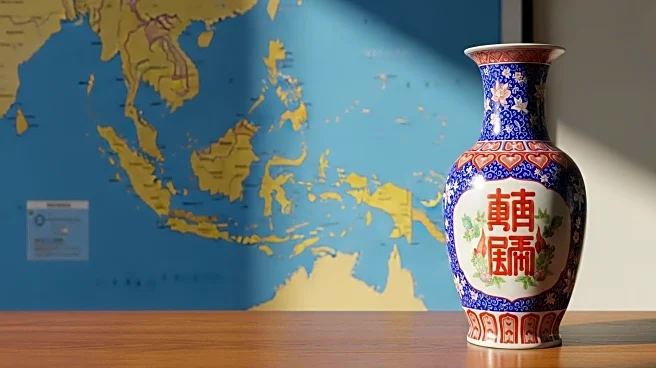What's Happening?
The Philippines has reaffirmed its commitment to the One China Policy, emphasizing its non-recognition of Taiwan as a sovereign state. This stance was reiterated by the Department of Foreign Affairs following a Senate hearing led by Sen. Imee Marcos, who highlighted the potential impact of a conflict over Taiwan on the Philippines due to its geographical proximity. The Philippines continues to engage economically with Taiwan within the bounds of the One China Policy, while maintaining diplomatic relations with China. The historical context of this policy dates back to the 1975 Joint Communiqué between the Philippines and China, which established diplomatic relations and recognized the People's Republic of China as the sole legal government of China.
Why It's Important?
The Philippines' adherence to the One China Policy is crucial for maintaining regional stability and avoiding direct involvement in the cross-strait political dispute. This policy allows the Philippines to balance its economic and security interests, given its strategic location and the presence of Filipino workers in Taiwan. The geopolitical dynamics in the region, particularly the territorial disputes in the West Philippine Sea, necessitate a careful diplomatic approach to avoid antagonizing China, an emerging regional power. The Philippines' stance also reflects its strategic alignment with the United States, which could influence its response to potential conflicts involving Taiwan.
What's Next?
The Philippines is likely to continue strengthening its maritime, aerial, and surveillance capabilities to deter threats in the West Philippine Sea. It may also deepen economic ties with Taiwan, focusing on technology and manufacturing sectors, while maintaining diplomatic equilibrium with China. The government is expected to enhance its alliances within ASEAN to bolster economic security and reduce reliance on major powers. The ongoing geopolitical tensions may prompt further diplomatic engagements and strategic partnerships to safeguard national interests.
Beyond the Headlines
The Philippines' position highlights the complex interplay between economic development and national security in the region. The country's strategic yet pragmatic approach allows it to engage selectively with both China and Taiwan, extracting benefits while maintaining flexibility in diplomatic relations. The focus on economic revitalization through engagement with China and informal ties with Taiwan underscores the importance of balancing development and defense priorities.










